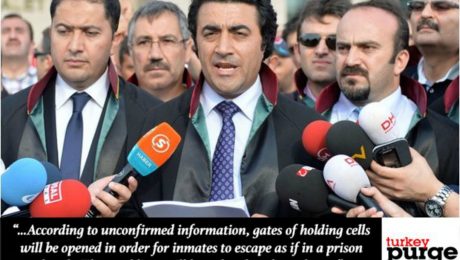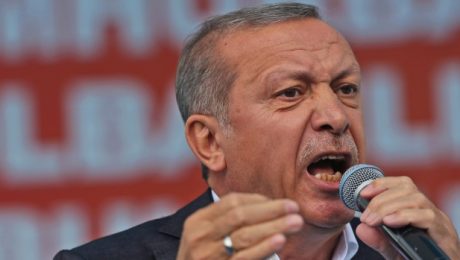Opinions

Turkey’s looming prison massacre grows nearer
It appears Erdogan fears that if the judiciary begins trial for key political prisoners, the prisoners would have a venue at which to speak and raise questions Erdogan does not want addressed, especially with regard to the possibility that the events on the evening of July 15 were Turkey’s equivalent of the Reichstag fire.

Hizmet and Turkey’s relations with Nigeria
Apart from establishing most successful educational institutions in Nigeria, the Hizmet Movement, which is also referred to as Gulen Movement, has been in the fore-front in propagating modern face of Islam, while at the same time building bridges of peace through interfaith dialogue.

Erdogan’s ego eclipses Pakistan-Turkey ties
In Pakistan, where more than 27 million children remain out of school, every teacher and educational institution matters. The Turkish non-governmental schools in question are ranked among the best in terms of in infrastructure, as well as quality of education and character-building.

From ‘parallel state’ to ‘terrorist organization’: Dissecting Erdoğan’s labeling of Gülen
Yet more than three years since the public feud between Erdoğan and Gülen began, the allegations against the Gülen movement of infiltrating the state, plotting coups, and proselytizing students through its schools still rest on speculation.

Are Turkey’s Prisoners Hostages?
Rumors have circulated throughout Turkey that, under the guise of averting a prison riot, Erdogan might order his forces to fire on the prisons. It is not a scenario beyond the realm of possibility; after all, the late Libyan dictator Muammar Gaddafi did something similar, killing more than 1,000 political prisoners.

Turkish engagement with Southern Africa depends on the Turkish attitude towards Hizmet
Turkish engagement with Southern Africa will not be without challenges. The success of this engagement will depend on the Turkish attitude towards the Hizmet Movement. If Turkey decides to tackle the Hizmet Movement head on as it has done in Turkey and in other countries, it will risk alienation in South Africa and the wider region. The Hizmet Movement is generally popular in Southern Africa, with long standing ties to civil society and the political elite.

Crackdown in Turkey passes the point of no return
Turkey’s alliances with the US and EU are fraying badly. Above all, Mr Erdogan is moulding the country in his own image, with only a uniform message allowed. As one liberal intellectual puts it: “In the past you got arrested for what you said, but now you can be arrested for what you don’t say.”

Turkey’s Erdogan and onslaughts against opposition
Gulen movement, which is inspired by the highly-respected United States based cleric, Fethullah Gulen, has been brazenly targeted for total destruction by President Erdogan after the failed coup in that country few months ago. The iron-hand President accused members and sympathisers of the movement as being behind the coup.

Ten thoughts on the [Erdogan] way of trolling
I’ve been writing about Turkey for more than a decade now. It’s a beautiful country, rich in history, and a complex society but, boy, in recent years their trolling has left a lot to be desired. It’s not just the internet trolls who have fallen far behind but also Turkish diplomats and even senior aides to President Recep Tayyip Erdogan.

In Erdogan regime western-oriented intellectuals, bureaucrats, liberals, Kurds, civil society activists in mortal danger
Those in prison—educated, Western-oriented intellectuals and bureaucrats, liberals, Kurds, civil society activists, and supporters of exiled cleric Fethullah Gülen—are in mortal danger. When blood flows from the prisons, it will be no accident nor should anyone believe Erdogan’s security forces were simply reacting to a crisis.

Turkish business suffers under Erdogan’s post-coup Gulen purge
Critics of the ruling AKP expect it to sell Gulen-linked companies to government allies in the business world at a large discount. In mid-October the AKP-linked Metro Holding applied to the TMSF to acquire all of Koza Ipek Holding’s shares. Akin Ipek, the fugitive former owner of the conglomerate, asked on Twitter how Koza Ipek’s $600 million in cash and $20 billion in mining assets could be acquired by a comparatively unimpressive entity. Metro Holding’s capital comes to just over $95 million.

Understanding the Hizmet Movement in Nigeria
I will start on high-note. The Hizmet movement is not a cult. The participants of the Hizmet movement are not terrorist. The Hizmet movement philosophy does not encourage any form of violence, let alone coup plotting. The Hizmet movement is anchored on love, tolerance, and peaceful co-existence.

What Is Next In Turkey?
The generals were never the script writers of the coups but only players. The script writers of the coup on July 15 in Turkey aimed to simulate a coup as if it was staged by the Gulen movement. It was simply a false flag. While only a few hundred soldiers were involved in the coup, more than ten thousand officers were purged and arrested. While the police officers challenged the coup plotters, twelve thousand police officers were fired two months after the coup.

Gulen Movement And Transparency
The transparency of the Hizmet or Gülen Movement has long been a theme of various critics – writers, intellectuals and politicians. In the context of Turkey where secularism is deployed as a means to control religion rather than to separate it from politics, it is not hard to understand why this theme has been so popular.


















